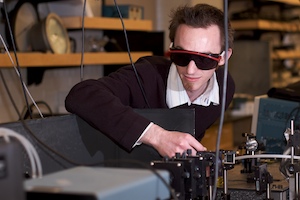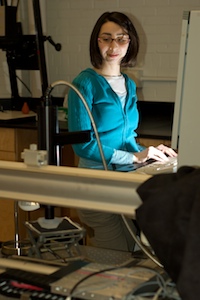
Ed Grant
Profile
Research and Teaching Interests
Our laser spectroscopy group focuses on fundamental questions of chemical physics. High-power tunable laser systems excite and ionize molecules to investigate positions and intensities of individual quantum states. The results provide information on the dynamics of intramolecular energy transfer and relaxation.
Ultracold Plasmas
We have developed new, molecular beam techniques to study ultracold plasmas. Most of the matter in the universe by far exists in the form of a plasma, at temperatures ranging from a few million Kelvin in stars to a few hundred Kelvin in a flame. We form a plasma from molecules cooled to less than 1 K. Under these conditions, Coulombic forces can dominate the thermal energy of the ions and electrons, allowing strong correlations to develop resulting in liquid-like effects and crystallization. The study of ultracold plasmas represents a new avenue of plasma physics. Results we obtain will help to understand conditions in plasmas at similar states of correlation in the cores of dense stars or under conditions of thermonuclear fusion.

Raman Spectroscopy
Students in our Raman spectroscopy group design new instruments to collect spectra from biologically relevant samples with sizes down to microscopic dimensions. We analyze spectra using sophisticated multivariative classification techniques to obtain information on the state of the sample and its chemical composition.

Contact
Curriculum Vitae
B.A., 1969 Occidental College; Ph.D., 1974, University of California, Davis; R&D 100 Award, 1998; Fellow of the American Physical Society, 1992; Humboldt Research Award for Senior U.S. Scientists, 1992, 2012; Professeur Invité, Laboratorie de Photophysique Moléculaire, Université de Paris-Sud, 1991, 2011; Kelly Award for Excellence in Undergraduate Teaching, 1990; Fulbright Senior Scholar, 1988; Visiting Professor Physics, University of Crete and Foundation for Research and Technology, Hellas, 1988; Nobel Laureate Signature Award, 1986
